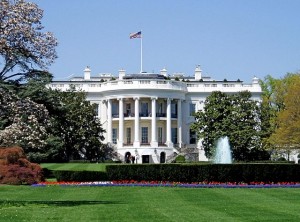On the Hill: President Obama’s Justice Agenda
 Photo by Matt Wade
Photo by Matt Wade On Tuesday I was invited by the White House to meet with Roy Austin, Deputy Assistant to the President for Urban Affairs, Justice, and Opportunity. Austin, who just moved over to the White House after several years at the Department of Justice’s Office of Civil Rights, has an extremely wide portfolio at the White House, handling issues like criminal justice, criminal reentry, juvenile justice reform, minimum wage, disability issues, voting rights, foster care, homelessness, and teen pregnancy, to name a few.
One of the key issues that advocates want Austin to work on is voting rights, especially in the wake of the Supreme Court decision last year that struck down a vital section of the Voting Rights Act, a law that prohibits discrimination in voting based on race, color, or English language proficiency. In fact, a bill was recently introduced in the House with bipartisan support called the Voting Rights Amendment Act to restore that section, albeit modified to incorporate the Supreme Court’s concerns, so as to protect vulnerable voters.
Unfortunately, while leading civil and voting rights activists are attempting to push the bill through Congress, Austin is pessimistic about its chances of passing. He noted that the chairman of the committee that the bill has been assigned to hasn’t even scheduled a hearing on the bill, and that Congress has been so divided on so many other important issues that the chance of a legislative solution on this issue is slight. Still, Austin did admit that a legislative solution to this issue might yield the best results and be harder to overturn in the future.
Instead, Austin is looking for potential executive actions that the White House can take on this and other issues of importance, echoing a statement made by President Obama during this year’s State of the Union address that promised to do just that. While the specifics of these future executive actions weren’t discussed, the White House is interested in moving the needle on issues like ending solitary confinement for juvenile offenders, providing more job and education training for those leaving the prison system and reentering society, and raising the minimum wage.
I got the sense from the meeting that if advocates want to see progress on a variety of issues currently before Congress that they will have to do the work themselves, as the White House is simply done with the legislative branch after years of bad relations. While that doesn’t mean that the White House will sit back and do nothing on these issues (as they will be working without Congress to implement as much change as possible through executive actions) it does mean that they are tired of wasting time and resources on a Congress that is in a perpetual state of gridlock and partisan bickering.
